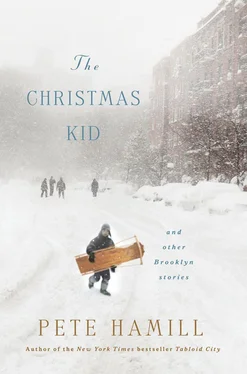If the buildings were the same, the shops along the avenue were all different. Fitzgerald’s bar was gone, where his father did most of his drinking, and so was Sussman’s hardware and Fischetti’s fruit and vegetable market and the Freedom meat store and the pharmacy. What was the name of that drugstore? Right there. On that corner. An art supply store now. An art supply store! Moloff’s. The drugstore was called Moloff’s, and next door was a bakery. Our Own, they called it. And now there was a computer store where a TV repair shop once stood. And a dry cleaner where men once stood at the bar of Rattigan’s, singing the old songs. All gone. Even the old clock factory had been converted into a condominium.
None of this surprised Carmody. He knew they’d all be gone. Nothing lasts. Marriages don’t last. Ball clubs don’t last. Why should shops last? Wasn’t that the point of each one of his seventeen books? The critics never saw that point, but he didn’t care. Those novels were not literature, even to Carmody. He wasn’t Stendhal, or Hemingway, or Faulkner. He knew that from the beginning. Those novels were the work he did after turning forty, when he reached the age limit for screenwriting. He worked at the top of his talent, to be sure, and used his knowledge of movies to create plots that kept readers turning the pages. But he knew they were commercial products, novels about industries and how they worked, his characters woven from gossip and profiles in Fortune or Business Week . He had started with the automobile industry, and then moved to the television industry, and the sugar industry, and the weapons industry. In each of them the old was destroyed by the new, the old ruling families decayed and collapsed, the newer, more ruthless men and women taking their places. The new book was about the food industry, from the farms of California to the dinner plates of New York and Los Angeles. Like the others, it had no aspirations to be seen as art. That would be pretentious. But the books were good examples of craft, as honest as well-made chairs. In each of them, he knew, research served as a substitute for imagination and art and memory. Three different researchers had filed memos on this last one, the new one, the novel he would sign here tonight, in the Barnes & Noble five blocks behind him. He hoped nobody in the audience would ask why he had never once written about Brooklyn.
To be sure, he had never denied his origins. There was a profile in People magazine in 1984, when his novel about the gambling industry went to number one on the New York Times bestseller list and stayed there for seventeen weeks. He was photographed on the terrace of the house in Malibu with the Pacific stretched out beyond him, and they used an old high school newspaper photograph showing him in pegged pants and a T-shirt, looking like an apprentice gangster or some variation on the persona of James Dean. The article mentioned his two ex-wives (there was now a third woman enjoying his alimony checks), but the reporter was also from Brooklyn and was more intrigued by the Brooklyn mug who had become a bestselling author.
“You went west in 1957,” the reporter said. “Just like the Dodgers.”
“When they left, I left, too, because that was the end of Brooklyn as I knew it,” Carmody said. “I figured I’d have my revenge on Los Angeles by forcing it to pay me a decent living.”
That was a lie, of course. He didn’t leave Brooklyn because of the Dodgers. He left because of Molly Mulrane.
Now he was standing across the street from the building where both of them had lived. The sidewalk entrance then was between a meat market and a fruit store, converted now into a toy store and a cell phone shop. Molly lived on the first floor left. Carmody on the top floor right. She was three years younger than Carmody and he didn’t pay her much attention until he returned from the army in 1954. An old story: she had blossomed. And one thing had led to another.
He remembered her father’s rough, unhappy, threatening face when Carmody first came calling to take her to the movies. Paddy Mulrane, the cop. And the way he looked when he went out in his police uniform for a four-to-twelve shift, his gun on his hip, his usual slouch shifting as he walked taller and assumed a kind of swagger. And how appalled Paddy Mulrane was when Carmody told him he was using the GI Bill to become a writer. “A writer? What the hell is that? I’m a writer, too. I write tickets. Ha-ha. A writer…how do you make a living with that? What about being a lawyer? A doctor? What about, what do they call it now, criminology? At least you’d have a shot at becoming a lieutenant.…” The father liked his Fleischmann’s and beer and used the Dodgers as a substitute for conversation. The mother was a dim, shadowy woman who did very little talking. That summer, Molly was the youngest of the three children, and the only one still at home. Her brother Frankie was a fireman and lived with his wife in Bay Ridge. There was another brother: what was his name? Sean. Seanie. Flat face, hooded eyes, a hard, tanklike body. Carmody didn’t remember much about him. There had been some kind of trouble, something about a robbery, and Seanie had moved to Florida, where he was said to be a fisherman in the Keys. Every Sunday morning, father, mother, and daughter went to Mass together.
Now, on this frozen night, decades later, Carmody’s unease rushed back. Ah, Molly, my Molly-O…The fire escapes still climbed three stories to the top floor, where the Carmodys lived. But the building now looked better, like all the others on the avenue. On the top floor right on this frozen night, the shades were up and Carmody could see ocher-colored walls and a warm light cast by table lamps. This startled him. In memory, the Carmody flat was always cold, the windows rimed with frost in winter, he and his sisters making drawings with their fingernails in the cold bluish light cast from a fluorescent ceiling lamp. His father was cold, too, a withdrawn, bitter man who resented the world and the youth of his children. His mother was a drinker, and her own chilly remorse was relieved only by occasional bursts of rage. His parents nodded or grunted when Carmody told them about his ambitions, and his mother once said, in a slurred voice, “Who do you think you are, anyway?”
One Saturday afternoon in the Mulrane flat, he and Molly were alone, her parents gone off to see Frankie and his small child. Molly proudly showed him her father’s winter police uniform, encased in plastic from the Kent dry cleaners, and the medals he had won, and the extra gun, a nickel-plated.38-caliber Smith & Wesson, oiled and ready in a felt-lined box. She talked to him about a book she was reading, by A. J. Cronin, and he told her she should read F. Scott Fitzgerald. She made him a ham-and-Swiss-cheese sandwich for lunch. They sipped sweet tea thick with sugar. And then for the first time, they went to bed together in her tiny room with its window leading to the fire escape. She was in an agony, murmuring prayers, her hands and arms moving to cover breasts and hair, trembling with fear and desire. “Hold me tight,” she whispered. “Don’t ever leave me.”
He had never written any of that, or how at the end of his first year of college, at the same time that she graduated from St. Joseph’s, he rented the room near New York University to get away from his parents and hers, and how she would come to him after work as a file clerk at Metropolitan Life and they would vanish into each other. He still went back to Brooklyn. He still visited the ice house of his parents. He still called formally at the Mulrane apartment to take Molly to the Sanders or the RKO Prospect. But the tiny room in Manhattan had become their true place, their gangster’s hideout, the secret place to which they went for sin.
Читать дальше












